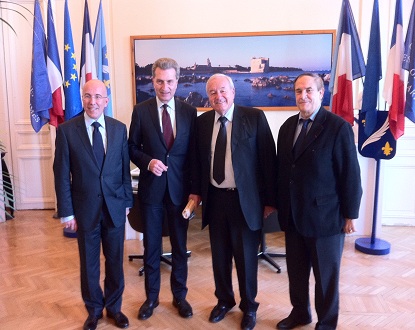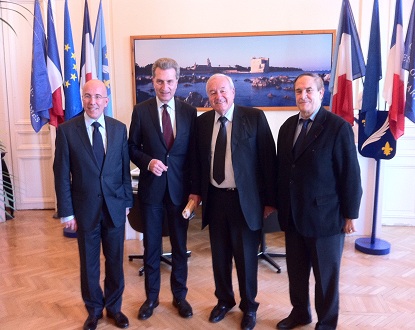The Cannes city hall scheduled a meeting with Mr. Günther Hermann Oettinger, the European Commissioner for Energy, as part of the Territorial Climate Energy Plan. A review of the department’s ecological objectives.
 Since 2012, Cannes Antibes, Grasse, the Pôle Azur and Sophia Antipolis Agglomeration Communities have committed to implementing the Western 06 Territorial Climate Energy Plan (PCET). The Plan aims for the involved cities to meet common energy-saving goals. For example, by 2020, the municipalities have committed to reducing greenhouse gas emissions by 20%. To achieve this, they must find solutions to reach this target and make energy savings in buildings, transportation, etc.
Since 2012, Cannes Antibes, Grasse, the Pôle Azur and Sophia Antipolis Agglomeration Communities have committed to implementing the Western 06 Territorial Climate Energy Plan (PCET). The Plan aims for the involved cities to meet common energy-saving goals. For example, by 2020, the municipalities have committed to reducing greenhouse gas emissions by 20%. To achieve this, they must find solutions to reach this target and make energy savings in buildings, transportation, etc.
This plan will be finalized by 2013. A total investment plan of 560 million euros, involving all stakeholders, has been set up. It is divided into five themes: Transport, Construction and Development Work, Energy, Sustainable Economic Development, and Climate Change Adaptation.
The -20% target seems quite ambitious, even though the deadline is set for 2020. However, some results are already apparent; actions already taken (such as the Lighting Plan, which reduced Cannes’ electricity consumption by 20%) have saved 300,000 tons of CO2 equivalent since 2009. A good start considering the significant delay in ecology at the national and local levels.
Because yes, France is lagging in this area compared to our German neighbors who, for example, have only 20% of their energy from nuclear sources compared to 70% in France. By 2022, Germany plans to completely phase out nuclear energy.
It was precisely the German European Commissioner Mr. Günther Hermann Oettinger who came to visit the mayor of Cannes, Mr. Bernard Brochon, as well as the President of the Alpes-Maritimes General Council, Eric Ciotti. It was a courtesy meeting during which the objectives of the municipalities were reiterated.



